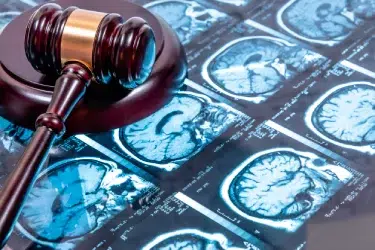NYC Brain Injury Lawyer
Thousands of New Yorkers suffer traumatic brain injuries (TBIs) each year, resulting in catastrophic life changes. If a negligent or intentional act caused your injuries, you have the right to be compensated for financial damages.
Contact an experienced New York Brain Injury Lawyer at The Platta Law Firm. Our firm believes that no one should pay physically and financially for someone else’s mistake.
We are here to take your call 24/7 since traumatic brain injury accidents don’t happen on a nine-to-five schedule. Call us at (212) 514-5100.
How Can a New York Brain Injury Attorney Help?
Recovering from a brain injury is challenging for many people and their families. Recovery can be difficult, lasting a long time. If you cannot work, money is short, and bills continue to pile up. We intercede so that you can concentrate on healing without worrying about financial matters.
Our experienced brain injury attorneys have won over $1.5 billion in settlements and verdicts for our clients. Each case is an opportunity to bring justice to injured New Yorkers. We never shy away from fighting for the rights of clients injured by careless or reckless acts.
Contact us online to schedule a free, confidential case review with a NYC brain injury attorney in any of the five boroughs. We will examine your case and discuss your options for recovering financial damages. If you cannot come to the office, we can come to you.
What Is a Traumatic Brain Injury?
A traumatic brain injury usually results from a jolt, bump or blow to the head, damaging the brain. There does not need to be any external damage to the skull; however, penetrating TBIs do occur. It is possible to have only minor symptoms that go away with time. However, many TBIs have devastating consequences, causing disability or death.
How Are Head Injuries Classified?
There are two basic types of head injuries. If an object penetrates the skull and causes a traumatic brain injury, it is open trauma. If no damage to the skull exists, it is called a closed TBI. It is hard to determine the severity of the trauma based on outward appearance.
What Are the Different Types of TBI?
A brain injury can be serious, moderate or mild, depending on the severity of the injury and type of trauma. The less severe types of trauma may not require hospitalization, while the more serious ones do. The extent of the injury and potential complications will determine the course of treatment. The different TBI types are:
Concussions
Hitting your head can lead to a concussion. It can occur during a traffic accident, a fall or a blow to the head. This type of brain damage arises from the head’s rapid back-and-forth movement against the interior surface of the skull after impact. Most concussions heal within six months, but cognitive changes and pain can last for a year or more in some people.
Hematoma
A hematoma is a collection of blood from broken veins or arteries. It can occur on the surface of the brain or between the protective layers around it. A hematoma can cause swelling within the skull and reduce brain function. Surgical removal of the blood is often necessary to prevent further deterioration and death. Sometimes, a hematoma may resorb by itself if it is small.
Edema
An accumulation of fluid in the brain can cause it to swell. Because the skull is rigid, it does not have room to expand when this happens. Swelling can restrict the amount of oxygen the brain gets, which has disastrous effects. Damage can be irreversible without treatment or lead to death. Measures are taken to reduce the swelling and pressure on the brain.
Fractured Skull
A bone fragment may penetrate the brain, causing damage. This can occur when the skull breaks or cracks in an accident. This can cause cerebrospinal fluid (CSF) to leak out of the ears or nose. CSF leakage indicates an opening in the outermost covering of the brain due to trauma. Seizures and infections are common.
Coma
Serious accidents may result in significant brain damage that prevents the victim from regaining consciousness. This state can persist according to the nature and location of the injury. On occasion, the individual may be placed in an induced coma. An induced coma gives the brain time to heal and is reversible.
Diffuse Axonal Injury
The nerve cells in the brain have extensions, the axons, that allow them to communicate with one another. The extensions may be sheared off if the brain shifts suddenly within the skull. This injury causes extensive dysfunction by shearing off the axons, which transfer information from one brain cell to another.
What Causes a Traumatic Brain Injury?
The most common causes of a closed head injury are:
- Construction accidents: Being hit by a falling object or injured by a blast explosion.
- Child abuse: Abused children may suffer a TBI, especially those under four years of age.
- Falls: Often occur in homes or on a construction site. Falls are prominently seen in older adults.
- Sports injuries: Playing sports at all levels is responsible for many traumatic brain injuries.
- Motor vehicle accidents: MVAs happen frequently and are common in younger drivers.
- Being hit by an object: This action can happen in a motor vehicle accident or on a construction site.
The most common penetrating head injuries are:
- Shootings: A bullet can cause a penetrating head injury.
- Struck by a weapon: This includes bats, hammers and other objects used as a weapon.
Traumatic Brain Injuries Statistics

The number of traumatic brain injuries is consistent from one year to the next. In 2021, about 69,473 people died from a TBI in the United States. Overall, 214,110 entered the hospital. Moderate to severe TBIs may inflict physical, emotional, behavioral and cognitive brain dysfunction that persists after initial recovery. For instance, many people recover brain function after a moderate TBI.
This recovery often involves intense rehabilitation. Yet, about 50% of these patients will display cognitive problems or die over the next 5 years. Of those who are alive after 5 years, serious signs of TBI can persist:
- 55 percent are no longer employed
- 12 percent are in assisted living institutions
- 29 percent are addicted to alcohol or drugs
- 55 percent are severely or moderately disabled
- 33 percent need help with routine daily activities
- 29 percent display a general dissatisfaction with their life
- 50 percent enter the hospital, particularly males, children and the elderly
What Are the Long-Term Effects of a TBI?
Despite rehabilitation, someone who suffers a severe or moderate TBI still faces long-term challenges. For example, many experience a nine-year decrease in life expectancy, especially older adults or those with a severe or fall-related TBI. Some other issues are:
- Seizures occur 50 times more often
- Infections are nine times more likely
- Pneumonia incidence is six times greater
What Are the Symptoms of a Mild TBI?
The following are the symptoms that usually accompany a mild traumatic brain injury:
- Fatigue, headache and confusion
- Blurred vision
- Lightheadedness
- Ringing in the ears
- Short loss of consciousness
- Dizziness
- Memory loss
- Cognitive problems and problems concentrating
- Changes in personality
- Mood or behavior problems
What Are the Symptoms of a Severe or Moderate TBI?
The following accompany a moderate or severe traumatic brain injury:
- Seizures
- Large pupils
- Poor coordination
- Difficulty waking up
- Nausea and vomiting
- A worsening headache
- Numbness or weakness in the legs and arms
- Increasing confusion, anger and restlessness
How Is a Traumatic Brain Injury Diagnosed?
It is important to see a doctor as soon as possible after suffering a traumatic brain injury. The doctor will do a neurologic exam and may order an MRI or CT scan. He/she may also use the Glasgow coma score test to determine the severity of the TBI.
How Is a Traumatic Brain Injury Treated?
- Mild TBI: The type of treatment the patient receives is based on the location of the brain trauma, its severity and the size of the injury. In a mild/moderate TBI, the primary treatment is complete rest, along with OTC painkillers for a headache. It is important not to do more than instructed by a physician, since it may lengthen the recovery time.
- Moderate or severe TBIs are treated in the following way;
- Reduce pressure: Reduce the pressure inside the skull.
- Stabilization: This process includes blood pressure monitoring.
- Increasing the oxygen: Procedures help ensure that sufficient oxygen is available to the brain.
- Medications: The patient may be given medications to lower the chance of a blood clot and seizures. Other medications reduce anxiety, depression and muscle spasms.
- Surgery: If needed, the surgical team may remove hematomas and reduce the pressure in the skull. Skull fractures might be repaired and damaged brain tissue removed.
What Sort of Rehabilitation Do I Need?
This is decided after the person has medically recovered. In time, many will recover muscle strength and coordination. The patient may need to learn how to perform the daily tasks we take for granted, such as bathing, dressing and preparing a meal. If the injured individual has difficulty speaking and being understood, speech therapy is part of the rehabilitation process.
Psychological counseling may be part of the regimen to help patients interact with others and face the difficulties of daily life. Some patients may require vocational training before they can return to the workplace. Finally, cognitive therapy may help with memory, learning, attention and planning.
Do Only Serious Accidents Cause a TBI?
No, the seriousness of the accident is not absolutely predictive of a TBI. For instance, even a fall on a slippery surface or a minor car accident can cause a traumatic brain injury. Brain injury can be focal, where one area is traumatized in a mugging. However, a TBI can also be due to the brain bouncing back and forth against the rough interior surface of the skull in a minor fender bender.
An example of this is seen in rear-end accidents. The intense back-and-forth movement of the head (whiplash) that occurs when the car is struck from behind causes this type of damaging motion.
Medical Care and Financial Loss in a TBI
A brain injury attorney in New York may be able to recover damages when a negligent or intentional act by another person or entity results in a traumatic brain injury.
Medical Care
Extensive medical care is often needed when a serious TBI occurs. An attorney can recover the following: ambulance services, emergency room care, hospital costs, physician and surgical fees, and diagnostic tests. Recovered damages include rehabilitation expenses, at-home nursing services, and home modification/assisted devices. It is also possible to calculate the cost of medical care in the future if the TBI causes long-term or permanent disability.
Lost Wages
For many people, a TBI interferes with their ability to work. This may be short-term or lifelong. Between these two endpoints are those who can work with vocational training at their existing job or a different, less demanding type of employment. We can recover lost wages and benefits, pensions, and job perks.
Reduced Earning Capacity
Sometimes, the injured party can no longer perform their job duties and have to take a lower-paying position. Your New York brain injury lawyer will factor in the difference in salary between the person’s past job and their current one.
Disability
If the person is disabled, partially or totally, the wage loss will extend to the time of retirement had the accident not happened. The ability to recover wage loss includes contract workers.
Pain and Suffering
Beyond the damages listed above, the enormous emotional, physical and psychological pain a traumatic brain injury takes is also recoverable. For example, many TBI victims relive the accident and their injuries well into the future, limiting their ability to take part in former activities. They may have nightmares, agoraphobia, panic attacks and other symptoms. At its extreme, post-traumatic stress disorder may develop and require a physician’s help to overcome the symptoms.
Loss of Consortium
A TBI also affects the spouse, who may lose the closeness and other comforts their partner provided before the accident occurred. The injured spouse can join in the lawsuit and claim loss of consortium.
How Much Time Does My New York Brain Injury Lawyer Have to File?

There is a time limit to file an injury claim. This deadline is called the statute of limitations. Under New York Law (N.Y. Civ. Prac. R. Section 214), an injured party has three years from the date the accident injury occurs to file. If a lawsuit is filed beyond that time, it cannot proceed in a civil court. There are situations that might extend the deadline, and your attorney will be able to discuss this with you.
For example, the time limit changes if a government agency’s negligence is to blame for your injuries. In this case, you have 90 days from your injury to inform the agency about it. If you miss this deadline, your case will not be heard. The agency has 30 days to deal with your claim, either settling it or dismissing it. If nothing is done after 30 days, your brain injury lawyer in New York can bring the lawsuit before a civil court.
What Is Pure Comparative Negligence?
In some cases, the injured party may believe they were partly to blame for the accident. Because of New York State laws regulating liability, you may still be able to file a lawsuit. This type of shared liability is called pure comparative negligence.
For instance, if the other driver is 70 percent responsible for the accident and you are 30 percent at fault, you would still receive 70 percent of the damages you deserve. As you can see, the amount of compensation is reduced by the degree of liability you share. Your NYC brain injury lawyer will be able to factor this into your claim. Call our office at (212) 514-5100.
How Does New York No-Fault Insurance
Affect My Lawsuit?
New York is a no-fault state. Because of this, your insurance will pay damages whether you are at fault. If you are a passenger in a vehicle, the driver’s insurance will pay for your damages. There are times when you can step out of no-fault insurance and file a claim against the negligent person or entity. This ability refers to the serious injury threshold. Some injuries that quality are bone fractures, disfigurement, limitation on using a body organ/system or function or disability for 90 days.
Can a New York Brain Injury Lawyer Help Me
Settle my Case?

Your insurance company might offer a settlement offer soon after you file a claim. For many people, this may seem like a good offer. The insurance company knows that you may be financially strapped and preys on that knowledge. Sometimes, settling a case quickly is in your best interests. Sometimes, it is not. The biggest problem is that you cannot file again for the same accident once you agree to settle and take the money.
Since the settlement cannot be undone, it leaves you in a bad position, especially if the payout amount is too low. For instance, let’s say you begin medical treatment and seem to improve a week after the accident. You might think that the settlement offer is sufficient and sign the insurer’s release form saying you accept the funds as full payment.
A little later, your doctor says you will need surgery. If you accept the settlement offer, you must pay for that surgery yourself. It is important to be confident that you have reached your position of maximum recovery and that the settlement is enough to cover your medical care, lost wages and pain and suffering.
Also, in terms of a brain injury, the possibility of needing long-term care is strong. Talk to your New York brain injury lawyer before you decide. Having a lawyer on your side while negotiating with the insurance company is a good idea.
How Can a NY Brain Injury Lawyer Help Me?
Your New York brain injury lawyer will investigate your case thoroughly and uncover the necessary evidence to prove fault. Our legal team uses the evidence to build a strong case against the at-fault party. We do not let any piece of evidence slip by, and we give your case our full attention. In fact, we treat your injury and your right to compensation as our driving force and obligation.
With our 20 years of experience, we have won large sums for our clients. We know you are hurting, and your life is upside down. At the Platta Law Firm, we have the experience and the resources to ensure your rights are protected and that you receive the compensation you deserve. Call us at (212) 514-5100, or contact us online to schedule a free review where we examine your case, answer your questions and give you your options going forward. After you retain us, we work on a contingency basis. That means we won’t be paid until you win your case.


